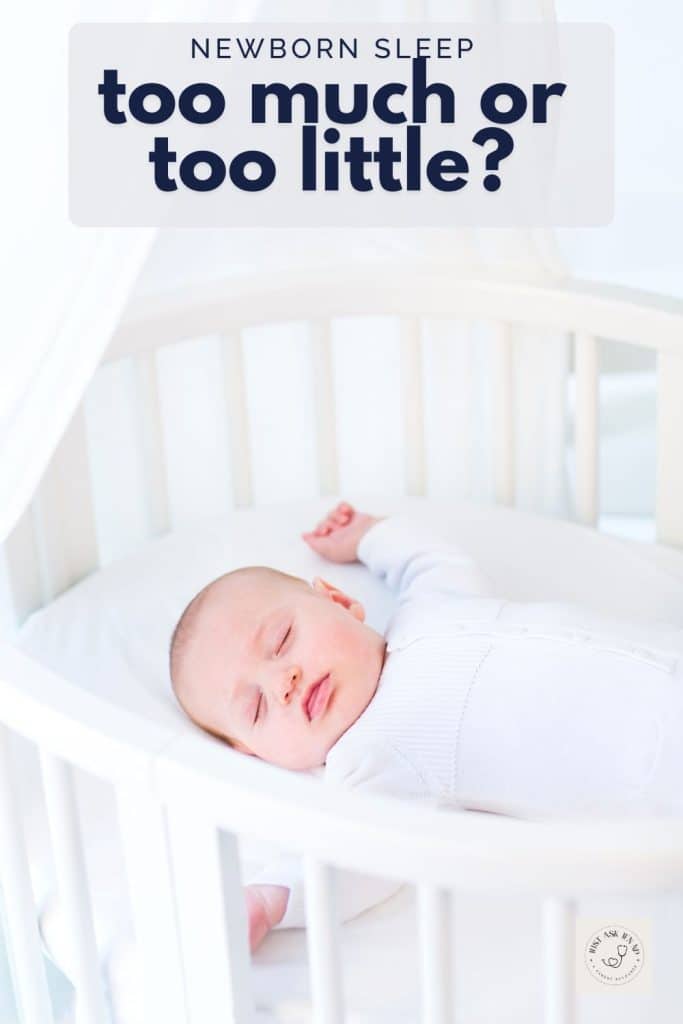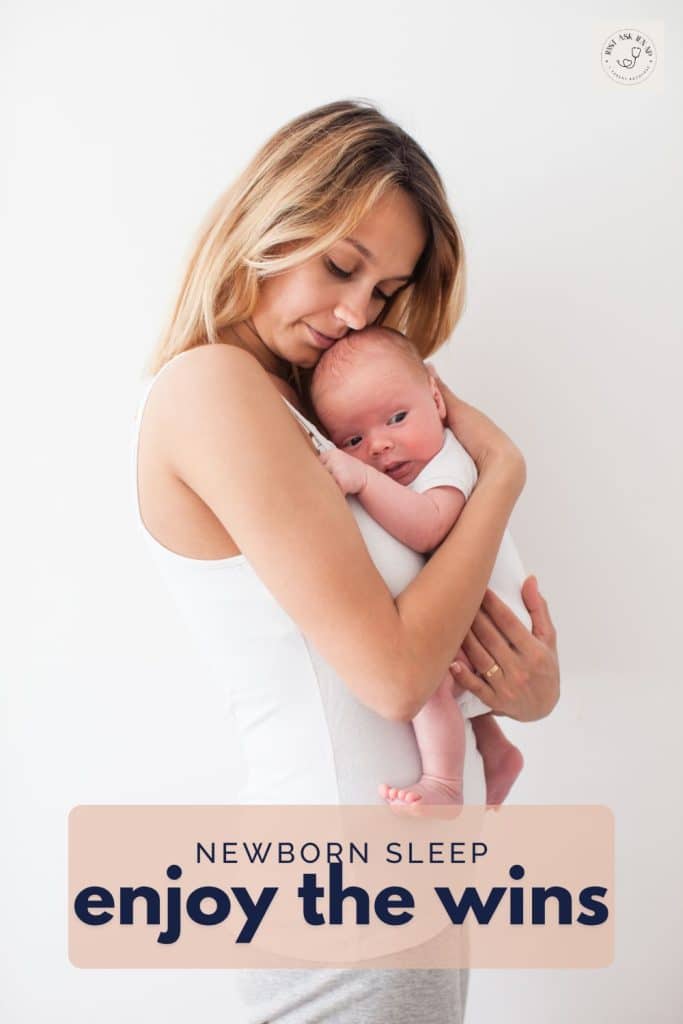Newborn Sleep: Is My Baby Sleeping Enough or Too Much?

As a pediatric nurse practitioner, one of the most common questions I hear from bleary-eyed new parents is some variation of “Is my baby sleeping enough?” or sometimes “Is my baby sleeping too much?” These concerns are completely normal, and today I want to provide you with evidence-based information about newborn sleep patterns to help ease your worries.
Click here for safe sleep guidelines for newborns.
Check out the best safe sleep products to provide the peace of mind needed to sleep peacefully when your baby sleeps.
What’s Normal for Newborn Sleep?

Let’s start with the facts:
- Total sleep time: Newborns (0-1 month) typically sleep 14-17 hours per 24-hour period, according to the American Academy of Sleep Medicine and the American Academy of Pediatrics.
- Sleep-wake patterns: Unlike adults, newborns don’t have established circadian rhythms. Their sleep is distributed throughout the day and night in 1-4 hour segments.
- Variation is normal: Some newborns may sleep as little as 11 hours or as much as 19 hours daily and still be within a healthy range.
- Frequent wakings: Waking every 2-3 hours is biologically normal and necessary for feeding.
Signs Your Baby May Not Be Getting Enough Sleep

While sleep needs vary, these signs might indicate your newborn isn’t getting adequate rest:
- Extreme fussiness or irritability beyond the typical “witching hour”
- Falling asleep during feedings and then waking shortly after, seeming hungry
- Difficulty settling even when showing clear tired signs
- Appears overtired with glazed eyes, red eyebrows, or excessive yawning
Is My Baby Sleeping Too Much?
Some parents worry when their newborn seems to sleep “all the time.” Here’s when to be concerned:
- When to monitor: If your baby regularly sleeps more than 17 hours per day and is difficult to wake for feedings
- Feeding frequency: Newborns should feed at least 8-12 times in 24 hours. If excessive sleep interferes with this, speak with your healthcare provider.
- Weight gain: If your baby is gaining weight appropriately and meeting other developmental markers, longer sleep periods may simply reflect your baby’s individual needs.
Tracking Your Newborn’s Sleep
I recommend keeping a simple log for the first few weeks to understand your baby’s patterns. Note:
- When your baby sleeps
- Duration of sleep periods
- Feeding times
- Mood when awake
Many baby apps offer tracking features, or a simple notebook works perfectly well. This information is incredibly valuable if you need to consult with your pediatric provider about sleep concerns.
Supporting Healthy Newborn Sleep

While newborns aren’t developmentally ready for sleep training, you can foster healthy sleep habits from the beginning:
DO:
- Practice safe sleep: Always place baby on their back on a firm, flat surface with no loose bedding, pillows, or toys.
- Watch for tired cues: Yawning, eye rubbing, fussiness, and looking away are early signs your baby is ready for sleep.
- Differentiate day and night: Keep daytime bright and engage with your baby. Keep nights dark, quiet, and interactions minimal.
- Accept help: Sleep deprivation is real. Take turns with your partner or accept help from trusted family and friends.
AVOID:
- Letting baby get overtired: An overtired newborn often has more trouble falling and staying asleep.
- Stimulating activities before sleep: Avoid bright screens, loud noises, or exciting play just before sleep times.
- Comparing to other babies: Each baby has unique sleep needs and patterns.
When to Call Your Healthcare Provider
Contact your pediatric healthcare provider if:
- Your baby is consistently sleeping through feeding times and difficult to wake
- Sleep patterns suddenly change dramatically
- Your baby seems excessively sleepy or lethargic
- You notice changes in breathing patterns during sleep
- You have concerns about weight gain
Final Thoughts

Remember that the newborn period is brief but intense. Your baby’s sleep patterns will evolve significantly over the coming months. The goal during this early stage isn’t to achieve perfect sleep but rather to meet your baby’s needs while preserving your own wellbeing as much as possible.
For more information on newborn sleep, check out this link https://kidshealth.org/en/parents/sleepnewborn.html
In our next post, we’ll discuss sleep patterns for 1-2 month olds, when you might start seeing subtle shifts in sleep organization and slightly longer stretches at night.
Disclaimer: This information is intended for educational purposes only and is not a substitute for personalized medical advice. Always consult with your pediatric healthcare provider regarding your specific situation and concerns.
